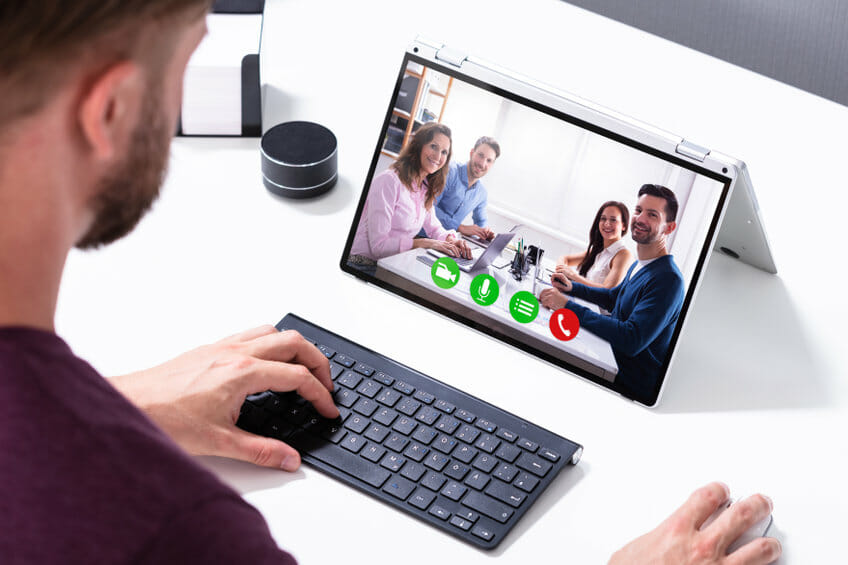When COVID-19 turned life upside down in March of 2020, businesses were forced to rapidly change the way they communicate to ensure continuity of operations in a world that could no longer sit in the same room. The cornerstone of that effort has been online video conferencing. For two years, we exchanged dress slacks and conference rooms for shorts and a webcam, performing all manner of tasks from the remote comfort of home. As we begin to transition into a post-pandemic world, business owners are starting to ask themselves: do we continue using video conferencing, or go back to business as usual?
MORE PHOTOS: Here’s why Gilbert was named nation’s best place to work from home
As a business attorney and commercial litigator with Engelman Berger, P.C. in Phoenix, I have watched Arizona’s legal community nimbly implement sweeping reforms to transition a wide variety of legal services online. Although many attorneys initially resisted the change, video conferencing has proved to be a valuable tool that can both increase access to justice and improve the efficiency of legal services. To determine how to effectively use video conferencing going forward, I worked with Lois W. Sayrs, PhD, a specialist in research methodology and Senior Biostatistician for the Children’s Hospital of Orange County Research Institute, to conduct a state-wide survey of Arizona’s attorneys, and published detailed results in the Arizona Attorney Magazine in November 2021. The results offered many insights relevant to the broader business community.

First, survey respondents almost unanimously agreed that video conferencing makes legal services (1) as convenient or more convenient than in-person services (with 57% answering “much more convenient”), (2) as cheap or cheaper (with 50% answering “much cheaper”), and (3) as easy or easier to access (with 33% answering “much easier”). In light of these benefits, attorneys were generally in favor of continuing the use of video conferencing for many tasks even after pandemic restrictions are lifted. For example, 89% were neutral or in favor of using video conferencing for simple court hearings, 84% for client meetings, 72% for oral arguments, and 67% for mediations. Notably, these percentages were consistent across all age groups (undermining the prevalent misconception that older individuals are opposed to the technology).
However, attorneys were more resistant to the continued use of video conferencing for trials, with 72% opposed for jury trials, and 54% for “bench” trials (i.e., trials decided by a judge rather than a jury), the primary concern being that video conferencing is less effective when it comes to determining witness credibility, measuring the reactions of the judge and jury, using demonstrative exhibits, and replicating the dignity of a courtroom.
For the business community, these results are instructive. If your services involve some form of communication, utilizing video conferencing can be incredibly beneficial. It makes it easier for customers to schedule an appointment, which will lead to increased customer satisfaction. And, it not only allows you to expand your customer base to other cities, states, or even countries, but also enables you to serve more customers while using your time more efficiently. However, if your service is more “experiential” (like a trial), you should think carefully about whether video conferencing will be an effective substitute.
If you are considering video conferencing for your business, there are a few common pain points to keep in mind. First, 68% of respondents expressed frustration with unstable internet connections, lost meeting invitations, and other interface issues. Additionally, 40% said that many problems during meetings are caused by poor equipment, such as poor camera placement, poor lighting, and busy backgrounds shared with pets, kids, and colleagues.
Although there is little you can do about your customers’ internet and equipment, you can certainly make sure that you are not the problem. Invest in high-speed internet, quality equipment, and support staff. Create a space suitable for video conferencing, meaning the space is quiet, has appropriate (not distracting) backgrounds, good lighting on your face, and a camera placed slightly above eye level. If you have an IT provider, lean on them to make sure your company’s A/V infrastructure is up to snuff at the office, at home, and for any employees that will need to video conference regularly. This is important both for client-facing and interoffice video conferences.
Second, 65% said the most problematic mistakes are those that result in audio disruptions, such as improper use of the mute button, loud background noise, and feedback caused by failure to wear headphones. Similarly, respondents often complained that other attorneys’ unfamiliarity with basic video conferencing functionality, like screen sharing, annotations, and breakout rooms, were to blame for disruptions and wasted time. The solution is simple: make sure you and your employees are properly trained. Test microphones and cameras before joining a meeting. Sign on in advance to make sure there is time to troubleshoot issues with equipment – being just 10 minutes early will avoid most delays. Similarly, consider what you can do to reduce customer errors. A simple one-page handout delivered in advance that gives your customer whatever information they will need to participate in the video conference – equipment, software, lighting, headphones, etc. – will help prevent problems before they arise.
Third, stay professional. 28% of respondents said they have seen people eating, smoking, driving, and walking outside or between rooms during conferences. These behaviors would be unacceptable in an office meeting, and remain unacceptable during a video conference. Train your staff on proper video conferencing decorum.
Video conferencing is here to stay, and should be embraced as a long-term opportunity, rather than a short-term symptom of the pandemic. If used properly, video conferencing can reduce costs, increase operational efficiency, and make your services more accessible and convenient to the customer.
Michael P. Rolland, Esq., is an attorney with Engelman Berger P.C., and maintains a broad business focused practice, assisting clients with business transactions, civil litigation, lending, chapter 11 bankruptcy, commercial landlord-tenant disputes, and water law. Michael serves on the Executive Counsel of the State Bar’s Business Law Section, and has been recognized as a “Rising Star” by Southwest Super Lawyers and as “One to Watch” by Best Lawyers.




